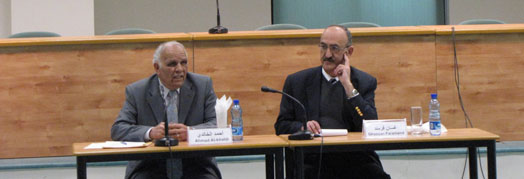Status of Legislation in the Palestinian Territory 2007-2012
With support from the Konrad Adenauer Stiftung, the Institute of Law (IoL) at Birzeit University organised on 14 March 2012 a legal encounter on the Status of Legislation in the Palestinian Territory 2007-2012. Delivered by Dr. Ahmed Al- Khalidi, Professor of Constitutional Law at A- Najah National University, the encounter brought together members of the Palestinian Legislative Council (PLC), judges, academics, representatives of civil society organisations and government bodies, and students at the Faculty of Law and Public Administration at Birzeit University.
In his opening remarks, Dr. Khalidi expressed his thanks to the IoL for organising this legal encounter to address this critical issue. Although it dates back to earlier historical periods, the status of Palestinian legislation, over 2007 and 2012 in particular, has posed an outstanding problem. Different legal systems had already been in place when the Palestinian Authority (PA) was established. In the process of materialising Palestinians’ public good and interest, it was hoped that the PA would consolidate legislation in force in the West Bank and Gaza Strip. Equality before the law is the most significant manifestation of sovereignty.
Dr. Khalidi presented some unsuccessful examples of PA attempts to consolidate legislation. Further entrenching the current legislative crisis, enforcement of the Basic Law has seen innumerable infringements. The legislative problem is witnessed in the following instances:
1. Some provisions of the Basic Law are withheld and violated.
2. The PLC is dysfunctional; it is politically and practically incapable of exercising its oversight and law-making role.
3. Law-making is assigned to other bodies.
Dr. Khalidi stated that the PLC, including both first and second terms, is a major factor that created the Palestinian legislative downturn. In addition to the fact that convention of the PLC was contingent on the PA President’s will, PLC members themselves were inactive as to preserve and promote the status and sound operation of the Council. Joint sessions were not held between the West Bank and Gaza.
Accordingly, the PA President plays a role in the legislative process on grounds of Article (43) of the Basic Law – cases of necessity. Other players in the current crisis are the two governments of Ramallah and Gaza. Finally, Dr. Khalidi proposed some solutions that would support PA consolidation efforts.
In the ensuing discussion, participants highlighted the need to eliminate the status of legislative dichotomy, which has been generated by the current political conditions in the Palestinian territory.











